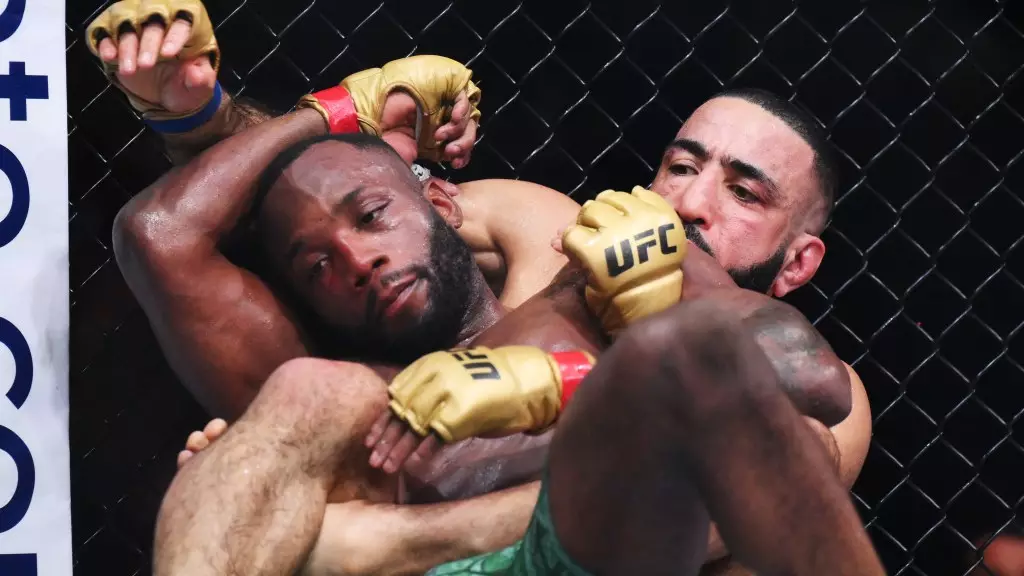The world of mixed martial arts is filled with stories of triumph and setbacks, where even the strongest fighters experience moments of vulnerability. Leon Edwards, a talented welterweight with an impressive track record, found himself in an unexpectedly precarious situation when he faced Belal Muhammad at UFC 304. Despite the outcome that may have seemed definitive, many, including his coach Dave Lovell, believe that the true essence of Edwards as a fighter was not fully realized that night. This narrative not only reflects the nuances of sports performance but also underscores the importance of context, timing, and sheer tenacity in an athlete’s journey.
Conditions That Derailed A Champion
Edwards’ performance against Muhammad culminated in a unanimous decision loss that shocked fans and analysts alike. At the core of the controversy lies the unorthodox timing of the fight—taking place in the early hours of the morning in England. Lovell passionately articulated how unprecedented and detrimental this schedule was for an elite athlete used to fighting in familiar conditions. “When have you ever heard of a sportsman performing at 6 o’clock in the morning?” Lovell questioned, emphasizing the irrationality of such a setup. Not only were physiological factors at play, but also psychological ones that could have hampered a fighter’s focus and stamina.
This critique isn’t merely an excuse but a reflection on how external factors can significantly impact performance. Edwards reportedly fought at only a fraction of his potential due to the unusual conditions that night, suggesting that the outcome cannot be taken at face value. Lovell’s observations raise an essential point about the nature of professional sports: even the most proficient athletes can falter when under abnormal circumstances.
A Road to Redemption
Moving forward, Edwards aims to reinstate his position in the welterweight landscape, preparing to face Sean Brady at UFC Fight Night 255. Losing to Muhammad snapped a remarkable 13-fight unbeaten streak, and the pressure is squarely on him to make a comeback. Lovell’s confidence in Edwards is palpable as he notes, “We’re on the road back to gold.” This evocative phrase not only denotes the ambition of Edwards to reclaim his title but also serves as an anthem for resilience. The transition from setback to resurgence is a theme that has long been celebrated in sports—it’s the ability to rise from adversity that often defines a champion.
Yet, the path to recovery may not be straightforward. Edwards was initially set to face Jack Della Maddalena, who was subsequently pulled to fight Muhammad for the title. Lovell’s contemplative acknowledgment of the sport’s politics adds layers to the narrative. The sport of MMA is driven by market dynamics, fighter popularity, and promotional opportunities. While it may seem unjust that Edwards didn’t get an immediate rematch, Lovell’s perspective might be one of acceptance—the fight game is not just about merit, but also timing and opportunity.
The Internal Drive to Succeed
Lovell’s assessment of Edwards’ performance—a mere 30% of what the fighter is truly capable of—hints at the deeper layers of an athlete’s psyche. This evaluation encourages introspection; athletes can often become their own harshest critics. They confront not only external opponents but internal doubts and pressures. Edwards must now battle against the shadow of his previous performance while harnessing the lessons learned from it. The element of self-belief becomes paramount in this narrative, as the fight game is as much mental as it is physical.
Lovell’s admission that “it’s a bitter pill to swallow” showcases the emotional weight carried by both coach and fighter. This connection reflects the sport’s essence—a complex web of camaraderie, disappointment, and undeterred ambition. It reminds us of the significant investment athletes and their teams make—not only in training but also in forging identities that extend beyond the octagon.
Looking Forward: Hope in Every Stride
As Edwards prepares for a critical moment in his career against Brady, one thing is clear: he’s not just fighting for redemption, but for reaffirmation of his status in the welterweight division. Lovell’s conviction that Edwards possesses the skills to reclaim his former glory serves as an anchor for both fighter and fans alike. The script of an athlete’s career is seldom linear; it is written through bouts of pain, recovery, and ultimately, triumph. It is a testament to the spirit of combat sports that each setback can lay the foundation for an even greater comeback.

